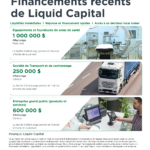5 Common Invoice Factoring Misconceptions Debunked
As a business owner, you’ve heard about invoice factoring. Maybe you’ve dismissed it as too expensive or complicated. But when bank loans aren’t an option and you need working capital, factoring deserves a clear-eyed second look.
Let’s cut through the confusion and examine the five most common invoice factoring misconceptions so you can decide if factoring fits your business.
1. “The fees are too high”
This objection comes up first in most conversations about factoring. Yes, factoring typically costs more than a traditional bank loan. But here’s what many miss:
- Factoring isn’t a loan – it’s an advance on money you’ve already earned
- The cost reflects the speed and flexibility you get
- Unlike loans, factoring grows with your sales without taking on debt
The real question: Will the capital generate more value than the fees?
For example, if factoring lets you take on a large new contract or get supplier discounts through early payment, the returns often outweigh the costs. But if you’re using factoring just to cover regular expenses, it’s worth a closer look to see whether your business has deeper cash flow issues.
2. “Invoice factoring will make my business look weak”
Many owners worry factoring will make their business look financially weak. Consider these points:
- Most customers already work with vendors who factor
- Major corporations regularly factor their receivables
- Professional factors handle customer communication with discretion
- You can often choose notification or non-notification factoring
The key is finding a factor who understands your industry and communicates professionally with your customers. A good factor becomes an extension of your accounts receivable team.
3. “I’ll lose control of my customer relationships”
This fear stems from horror stories about aggressive collection practices. Here’s the reality:
- Reputable factors succeed by maintaining good customer relationships
- You can set communication parameters with your factor
- Factors often improve customer relationships through professional AR management
- Many businesses find that factoring helps them serve customers better
Look for a factor who values long-term partnerships over quick profits. Ask about their collection practices and communication style.
4. “The application process is too complicated”
While bank loans require extensive paperwork and weeks of waiting, factoring typically offers:
- Simpler qualification requirements
- Focus on customer creditworthiness over your credit
- Faster approval process
- More flexible terms
Most factors can pre-qualify you in a single conversation. The full setup usually takes days, not weeks or months.
5. “I’ll become dependent on factoring”
You might have a deeper worry about financial sustainability and becoming addicted to factoring. But factoring can actually be a great way to get ahead. Smart use of factoring means:
- Using it strategically for growth opportunities
- Having a clear plan for how factoring fits your cash flow
- Understanding when to factor and when to use other financing
- Working with your factor to optimize your AR processes
Many businesses use factoring as a stepping stone to stronger financial footing. Others make it a permanent part of their cash flow strategy. The key is choosing what works for your business model.
The key is to make sure your factoring partner shares your goals. The goal at Liquid Capital is very future-focused: to get our clients “bankable.”
Making the Right Choice for Your Business
Invoice factoring isn’t right for every business. It works best when:
- You sell to creditworthy business customers
- Your profit margins can absorb the fees
- You need flexible funding that grows with sales
- Traditional financing doesn’t meet your needs
Focus on finding a funding partner who:
- Understands your industry
- Offers transparent terms
- Provides the level of service you need
- Treats your customers with professionalism
Understand both the costs and benefits. Talk to multiple factors. Ask tough questions about their processes (consider using this post as a guide). The right factoring relationship can transform your business – but only if you choose a partner who aligns with your needs and goals.
Reputable factors want you to succeed. They grow by helping businesses like yours thrive. Look for a partner who invests time in understanding your business and offers solutions tailored to your situation.






